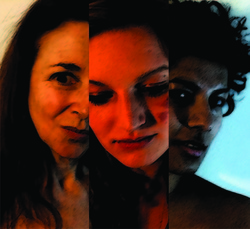The New Theatre Project's 'The Dance of the Seven Veils' focuses on true tales of sex workers

Linda Rabin Hammell, Amanda Lyn Jungquist, and Maria Thomas star in "The Dance of the Seven Veils."
Photo provided by The New Theatre Project
Inspired by playwright Charles Mee’s play, “Salome” — which largely drew material from sex workers’ blogs, and put the experiences of several women into the mouth of one female performer — “Dance” is a mix of testimonials, drawn from five different women; a few passages from Mee’s “Salome”; and some gap-filling original work by TNTP’s Amanda Lyn Jungquist, who compiled the script and sought out contact with women currently in the sex work industry.
“It was difficult to find people willing to talk in person or over the phone, which was our ideal form of research by making genuine connections with these women,” said Jungquist. “But in reading the various blogs and e-mails, I understand that it was probably difficult enough for them to even type up certain experiences, let alone re-tell them out loud in front of a complete stranger. More often than not the submissions ended with, ‘I wish I could talk about it, but it's too difficult,’ or ‘I wish I could tell people my story, but they wouldn't understand,’ and so, therein lies the job of the play, to tell the stories they've been forced into keeping to themselves.”
The idea for “Dance” initially evolved from director Keith Paul Medelis’ appreciation for Mee’s innovative approach to plays. (Mee claims there’s no such thing as an original play, and thus makes his work available for free use online, and invites theater artists to use the material, or alter it, as they see fit.)
“Mee has a similar mission to TNTP, in that he reinvents work,” said Medelis. “ … I visited his website, looking for a play that would fit into our season — ‘Identity’ — and ‘Salome’ was an attractive play in that it was a one-woman show, so it would be a cheap show to produce; but also, in reading that one, I realized that it was this really beautiful script about the realities of sex work.”
Ironically, though part of the play’s original appeal lay in the fact that it required only one performer, Medelis emerged from the audition process with three actresses (Jungquist, Linda Rabin-Hammell, and Maria Thomas) cast in “Dance.” He’d been captivated by the different things each one brought to the material.
PREVIEW
“The Dance of the Seven Veils”
- Who: The New Theatre Project.
- What: Based on Charles Mee’s work “Salome,” “Dance” tells a collage-style story based on the real lives of sex workers, drawn from interviews, blogs, books, and a social-networking site for sex workers. For mature audiences.
- Where: Pot & Box, 220 Felch St.
- When: Friday-Monday at 8 p.m., February 11-28. (Preview performance Wednesday and Thursday, February 9-10, at 8 p.m.)
- How much: $15 ($10 for students and seniors). Both preview performances are pay-what-you-can. To reserve tickets, call 734-645-9776 or send a message to tickets@thenewtheatreproject.org. To learn more about the company, visit www.thenewtheatreproject.org..
“One of the things I love about this process is that, when I signed up to direct, I didn’t know what I’d be directing,” said Medelis. “But through the rehearsal process, we’ve discovered that. … We go where the material goes.”
Another example of this is the large role that dance and movement have come to play in the show, choreographed by Ben Stange. “Amanda kept finding these comparisons of sex work with dancing, which led to the title, and led us to also find a form of movement, or a form of inspiration for each of the women. They each represent different stages of one woman’s life, so we’ve chosen different forms of movement to represent who she was in different times of life.”
Specifically, Medelis and his team are employing elements of ballet, tango, and yoga - as well as occasionally working in the actors’ hidden talents (like Rabin-Hammell’s ukulele-playing).
For Jungquist’s part, the surprises of “Dance”’s process included learning about two factions within the sex worker community — those who see all sex workers as victims, and those who see it as just another job and believe that prostitution should be legalized.
But in addition to that, after creating a profile on a Canadian social networking site for sex workers, and explaining their aims for the project, Jungquist got responses like, "’I don't really feel comfortable sharing, but I'd like to see the show if at all possible,’ or ‘It sounds like an amazing project, I wish there were more!’ — which, to me, completely validated our show as being relevant and important to the community.”

